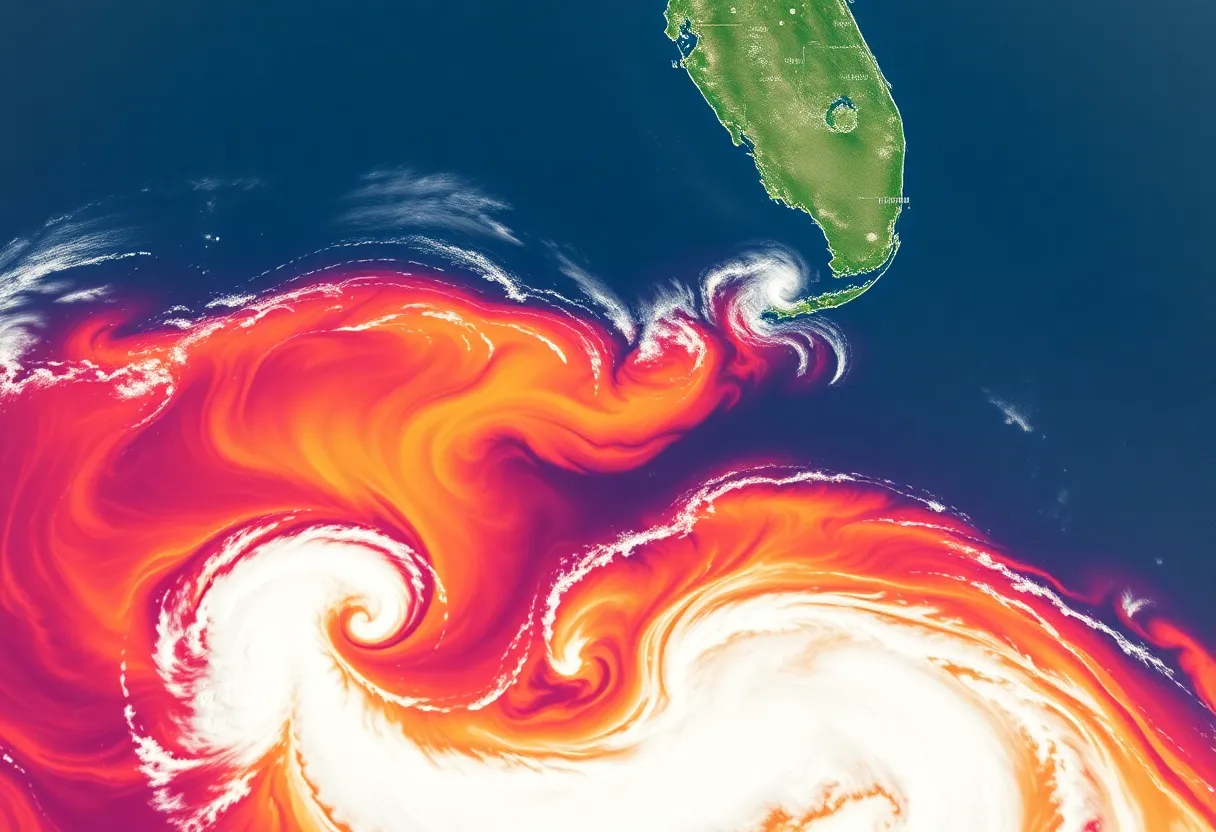News Summary
Florida is experiencing heightened hurricane risks this season due to an unprecedented marine heat wave affecting ocean temperatures. Water temperatures near Florida reached alarming levels, raising concerns among meteorologists. The ongoing conditions mirror previous catastrophic storms influenced by similar phenomena, indicating potential for another historic hurricane season. As ocean temperatures are expected to remain elevated, residents are urged to prepare for intensified storms and evaluate their home vulnerabilities ahead of the peak hurricane period.
Florida is facing a potentially heightened risk of intense hurricanes this season due to a marine heat wave currently affecting ocean waters in the western Atlantic and Gulf. Ocean temperatures near Florida, the Bahamas, the Florida Keys, and the Gulf have surpassed normal levels for this time of year, raising alarms among meteorologists and emergency preparedness officials.
One of the most concerning observations is that Buoy Key in the Florida Keys recorded a shocking water temperature of 99 degrees this month. This alarming spike in temperature is attributed to an intense heat wave that occurred last week, which critically warmed ocean waters, particularly in the Atlantic adjacent to Florida and throughout the Gulf. According to experts, marine heat waves can significantly intensify hurricanes, as demonstrated by the conditions affecting Hurricane Helene and Hurricane Milton last year, both of which were influenced by similar marine heat events.
Predictions indicate that ocean temperatures are expected to remain warmer than normal for at least the next month, thereby extending the duration of this marine heat wave. Meteorologists stress that residents of Florida should be prepared for the possibility of another historic hurricane season. A marine heat wave is defined as a prolonged period of unusually high ocean temperatures, with readings exceeding the 90th percentile of historical averages for at least five consecutive days.
Several factors are contributing to the current marine heat wave. Calm winds stemming from high-pressure systems prevent cooler deep water from mixing with the warmer surface water, along with clear skies and prolonged sunlight that exacerbate heating conditions. It is important to note that warm ocean water serves as energy for tropical storms and hurricanes, which can make them more powerful and potentially capable of producing greater destruction.
The peak of the hurricane season is anticipated to occur on September 10. Warmer ocean temperatures can lead to more frequent and intense storms during this critical period. Ongoing forecasts suggest several named storms could impact the Atlantic basin in the upcoming weeks, directly coinciding with the marine heat wave.
The official Atlantic hurricane season runs from June 1 through November 30, with heightened activity expected from mid-August to October. The National Oceanic and Atmospheric Administration (NOAA) has forecasted the formation of 13 to 18 named storms, with an expectation of 5 to 9 hurricanes, including 2 to 5 that could become major hurricanes. Similarly, Colorado State University forecasts around 16 named storms and 8 hurricanes for this season.
Factors influencing the hurricane season include climate conditions such as warmer-than-average sea surface temperatures and a favorable monsoon pattern in West Africa. Additionally, current predictions suggest ENSO-neutral conditions, indicating no significant influences from El Niño or La Niña this season.
Understanding the risks posed by hurricanes is essential for residents of Florida. Meteorologists recommend preparing before hurricanes threaten by assessing home vulnerabilities to storm surges, flooding, and strong winds. The marine heat wave poses not only risks for hurricanes but also for coral reefs and marine ecosystems, which adds complexity to global weather patterns.
As of early August, the U.S. landfall risk model indicates a moderate chance (around 50%) of a major hurricane making landfall based on current conditions, while the probability of any hurricane landfall remains high (85%-90%). Meteorological teams are currently monitoring potential weather systems forming in the Atlantic, with an 80% chance that one could develop into a significant storm in the coming week.
Considering these factors, it is crucial for Floridians to stay informed and ready as they navigate the pressures of an intensifying hurricane season compounded by rising ocean temperatures in the region.
Deeper Dive: News & Info About This Topic
- Fox 35 Orlando
- Wikipedia: Hurricane season
- USA Today
- Google Search: Marine heat waves
- Sun Sentinel
- Google Scholar: Hurricane intensity
- Tallahassee.com
- Encyclopedia Britannica: Hurricane
- Florida Trend
- Google News: Hurricane forecast 2025

Author: STAFF HERE PETERSBURG WRITER
The ST PETERSBURG STAFF WRITER represents the experienced team at HEREStPetersburg.com, your go-to source for actionable local news and information in St Petersburg, Pinellas County, and beyond. Specializing in "news you can use," we cover essential topics like product reviews for personal and business needs, local business directories, politics, real estate trends, neighborhood insights, and state news affecting the area—with deep expertise drawn from years of dedicated reporting and strong community input, including local press releases and business updates. We deliver top reporting on high-value events such as Grand Prix of St. Petersburg, Localtopia, and SHINE Mural Festival. Our coverage extends to key organizations like the St. Petersburg Area Chamber of Commerce and St. Pete Downtown Partnership, plus leading businesses in finance, manufacturing, and healthcare that power the local economy such as Raymond James Financial, Jabil, and Bayfront Health St. Petersburg. As part of the broader HERE network, including HEREJacksonville.com, HEREOrlando.com, HERETallahassee.com, and HERETampa.com, we provide comprehensive, credible insights into Florida's dynamic landscape.





